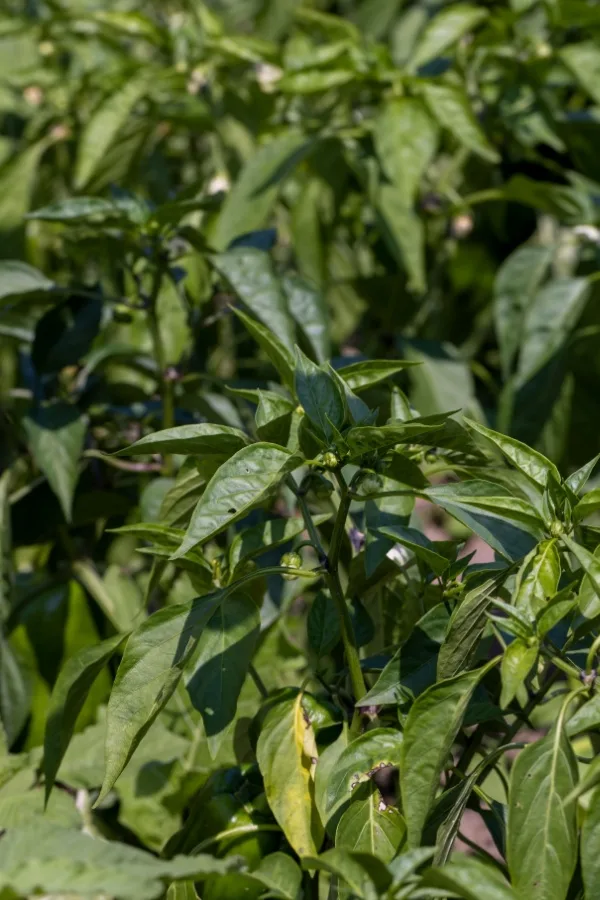Explore the Best Fertilizers for Peppers and Enhance Your Yard's Yield
Explore the Best Fertilizers for Peppers and Enhance Your Yard's Yield
Blog Article
Organic Vs. Synthetic Fertilizers: Which Is Best for Nurturing Healthy Pepper Plants?
In the realm of supporting healthy and balanced pepper plants, the option in between natural and artificial plant foods stands as a pivotal choice with significant effects. While both alternatives purpose to offer necessary nutrients to support plant growth, the nuances of their effect on the soil, plant wellness, and the environment spark an argument that echoes throughout the horticulture community. Understanding the unique advantages and possible mistakes of each fertilizer kind is critical for pepper farmers looking for to enhance their returns while preserving an eco-conscious and lasting strategy.
Benefits of Organic Fertilizers
Organic fertilizers provide an environmentally-friendly and lasting strategy to nourishing pepper plants, offering vital nutrients without making use of synthetic chemicals. These all-natural plant foods are originated from organic sources such as garden compost, manure, bone meal, and seaweed, promoting soil wellness and biodiversity. Unlike artificial plant foods, natural choices launch nutrients gradually, ensuring a steady and well balanced supply for pepper plants to prosper.
One considerable advantage of organic fertilizers is their ability to improve dirt structure and water retention. By enhancing soil wellness, natural fertilizers promote useful microbial activity, which assists in nutrient uptake by pepper plants. Additionally, organic plant foods minimize the threat of chemical run-off, securing water sources from pollution and guarding the environment.
Furthermore, natural plant foods add to long-term dirt fertility by promoting the growth of advantageous soil organisms. These organisms aid damage down organic matter, launching nutrients in a type that is conveniently accessible to pepper plants. best fertilizers for peppers. By promoting a healthy and balanced dirt environment, natural plant foods support lasting pepper farming techniques that profit both plants and the setting
Drawbacks of Synthetic Plant Foods
Artificial plant foods, in contrast to their natural equivalents, present various downsides when made use of to nourish pepper plants, impacting both plant health and environmental sustainability. One significant drawback of artificial plant foods is their propensity to seep nutrients from the dirt swiftly. This quick leaching can cause vitamins and mineral imbalances in the soil, creating plants to endure from shortages or poisonings. Furthermore, artificial fertilizers can damage beneficial dirt microorganisms, such as earthworms and useful microorganisms, interrupting the dirt ecosystem's equilibrium.
Furthermore, the overuse of artificial plant foods can add to water air pollution. Excess plant foods not absorbed by plants can wash away right into water bodies, leading to eutrophication, where algae blooms diminish oxygen degrees in the water, harming marine life. Moreover, artificial fertilizers are commonly derived from non-renewable sources, such as nonrenewable fuel sources, adding to carbon emissions and environmental deterioration throughout their manufacturing.
Nutrient Absorption Comparison
Efficient nutrient absorption plays a crucial duty in the overall health and wellness and development of pepper plants. When comparing artificial and organic fertilizers in terms of nutrient absorption, organic fertilizers have the advantage of providing an extra well balanced and slow-release source of nutrients (best fertilizers for peppers). Organic fertilizers contain a selection of macro and trace elements that are click over here now not just advantageous for the plants however likewise advertise healthy dirt microbial activity, which helps in nutrient uptake. On the various other hand, artificial plant foods typically offer a fast release of nutrients, which can cause leaching and overflow, leading to reduced nutrient absorption rates by the plants.
Moreover, natural plant foods boost dirt framework and water retention capability, enabling pepper plants to gain access to nutrients extra effectively. This improved soil high quality facilitates root growth, allowing better nutrient absorption. Synthetic plant foods, although at first boosting plant development because of their high nutrient concentrations, may hinder long-term nutrient absorption by derogatory dirt health and wellness with time.
Environmental Influence Factors To Consider

On the other hand, artificial plant foods, although commonly more concentrated and instantly available to plants, can have damaging effects on the atmosphere if not used correctly (best fertilizers for peppers). Their production calls for high power inputs, causing greenhouse gas discharges and contributing to environment adjustment. The drainage of excess synthetic plant foods can infect water sources, leading to eutrophication and hurting aquatic ecosystems.
Best Fertilizer Practices for Peppers
To accomplish this, it is necessary to follow best fertilizer methods tailored to the specific requirements of pepper plants. One essential method is to perform a dirt examination before applying any kind of plant foods.
One more vital practice is to fertilize pepper plants at the correct time. Generally, peppers take advantage of receiving fertilizer at planting and after that again when they begin to flower. Over-fertilizing can bring about vitamins and mineral imbalances and harm the plants, so it is crucial Learn More Here to adhere to suggested application prices.
Additionally, picking a well balanced fertilizer with an NPK proportion that suits pepper plants' needs is fundamental. Organic fertilizers, such as compost or manure, can be outstanding choices as they release nutrients slowly and boost soil structure in time. Nevertheless, synthetic plant foods can offer a fast nutrient increase when needed. Eventually, integrating natural and artificial plant foods sensibly can aid support healthy and balanced pepper plants while minimizing ecological influence.
Conclusion

Organic plant foods supply a sustainable and environmentally-friendly approach to beneficial pepper plants, supplying important nutrients without the usage of artificial chemicals. Unlike artificial fertilizers, natural options launch nutrients gradually, ensuring a steady and well balanced supply for pepper plants to thrive.
Artificial fertilizers, in comparison to their natural counterparts, posture different disadvantages when utilized to nourish pepper plants, impacting both plant health and ecological sustainability. When contrasting synthetic and natural fertilizers in terms of nutrient absorption, organic fertilizers have the benefit of supplying a more well balanced and slow-release source of nutrients.Furthermore, natural fertilizers boost dirt structure and water retention capacity, enabling pepper plants to access nutrients more effectively.
Report this page